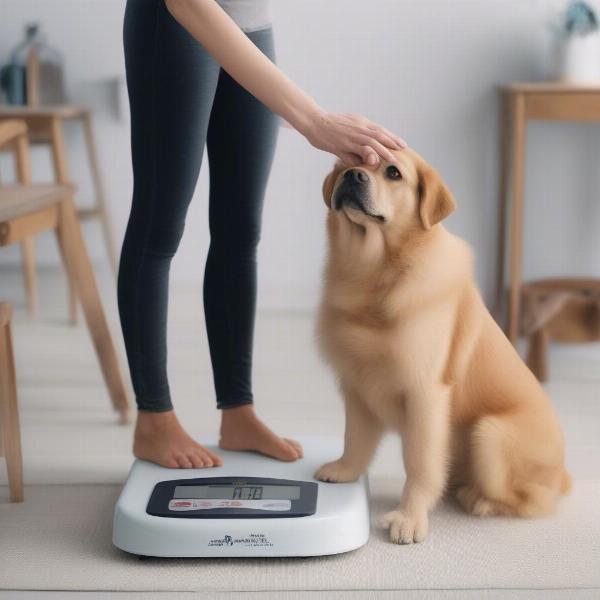Dextromethorphan dosage for dogs by weight is a crucial topic for pet owners dealing with canine coughs. While dextromethorphan can be helpful in suppressing a dog’s cough, administering the correct dosage is paramount to its safety and effectiveness. This article provides a comprehensive guide on understanding dextromethorphan, its appropriate usage, and calculating the correct dosage based on your dog’s weight, empowering you to make informed decisions about your furry friend’s health. Remember, always consult with your veterinarian before administering any medication to your dog.
Understanding Dextromethorphan for Dogs
Dextromethorphan, often abbreviated as DXM, is a cough suppressant commonly found in over-the-counter medications for humans. It works by affecting the signals in the brain that trigger the cough reflex. While it can be used in dogs, it’s essential to understand that it’s not approved by the FDA for veterinary use. This means careful dosage calculation and veterinary guidance are crucial. DXM is typically used for dry, non-productive coughs, but it won’t address the underlying cause of the cough.
Calculating the Correct Dextromethorphan Dosage for Dogs by Weight
Determining the right dextromethorphan dosage for dogs by weight is essential to avoid potential side effects. The general guideline is 0.5-2 mg per pound of body weight, given every 6-12 hours. However, this is a general range, and the specific dosage should be determined by your veterinarian. Factors such as your dog’s age, overall health, and the specific product used can influence the appropriate dosage.
 Measuring a Dog's Weight
Measuring a Dog's Weight
Potential Side Effects and Precautions
While generally considered safe when administered correctly, dextromethorphan can cause side effects in dogs, including drowsiness, vomiting, diarrhea, and in rare cases, more severe reactions. It’s crucial to monitor your dog closely after administering the medication and contact your veterinarian immediately if you notice any unusual symptoms. Never give dextromethorphan to dogs with liver disease, glaucoma, or those taking certain medications like MAOIs. Always inform your vet about any other medications your dog is currently taking. dosage for robitussin dm for dogs offers more information on a specific brand containing dextromethorphan.
What to Do if Your Dog Overdoses on Dextromethorphan
If you suspect your dog has overdosed on dextromethorphan, seek immediate veterinary attention. Signs of an overdose can include agitation, restlessness, panting, increased heart rate, and seizures. Time is of the essence in these situations, as prompt treatment can significantly improve the outcome.
When Should You Consult a Veterinarian?
A cough can be a symptom of various underlying conditions, from kennel cough to heart problems. While dextromethorphan can temporarily suppress the cough, it’s crucial to identify and address the root cause. robitussin dosage for dogs can provide additional context if you’re considering using this specific product. Consult your veterinarian if your dog’s cough persists for more than a few days, worsens, or is accompanied by other symptoms like lethargy, loss of appetite, or difficulty breathing.
Conclusion
Understanding dextromethorphan dosage for dogs by weight is crucial for responsible pet ownership. While DXM can offer relief from coughing, it’s paramount to administer it correctly under the guidance of a veterinarian. Never self-medicate your dog, and always prioritize professional advice. robitussin dm dosage for dogs offers further details on this specific medication. By working closely with your vet and following the guidelines in this article, you can ensure your furry friend receives the appropriate care and treatment. robitussin for dogs dosage chart can be a helpful resource for understanding dosage ranges.
FAQ
- Is dextromethorphan safe for all dogs? No, it’s not safe for all dogs, especially those with pre-existing health conditions. Consult your veterinarian.
- What are the signs of a dextromethorphan overdose in dogs? Signs can include agitation, restlessness, panting, increased heart rate, and seizures.
- Can I give my dog human cough medicine with dextromethorphan? No, some human medications contain other ingredients that are toxic to dogs. Only use products specifically formulated for pets, under veterinary guidance.
- How often can I give my dog dextromethorphan? Follow your veterinarian’s instructions. The general guideline is every 6-12 hours, but this can vary.
- What should I do if my dog’s cough doesn’t improve with dextromethorphan? Consult your veterinarian. The cough may have an underlying cause that needs different treatment.
- Can I use dextromethorphan long-term for my dog’s cough? No, dextromethorphan is typically used for short-term cough suppression. Long-term use requires veterinary supervision.
- Are there any natural alternatives to dextromethorphan for dogs? Yes, some natural remedies may help soothe coughs in dogs. Consult your vet for safe and effective options. robitussin dogs dosage provides additional information.
ILM Dog is a leading international online resource dedicated to providing expert advice and guidance on dog care and wellbeing. We cover a wide range of topics, from breed selection and health care to training, nutrition, and grooming. Whether you’re a seasoned dog owner or just starting your journey, ILM Dog offers valuable resources to help you provide the best possible care for your furry companion. For personalized advice or to learn more about our services, contact us at [email protected] or call us at +44 20-3965-8624. Visit our website at ILM Dog for a wealth of information on all aspects of dog care.